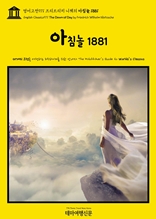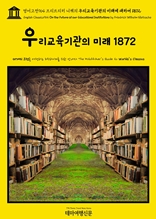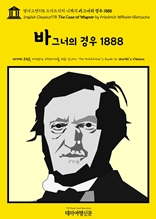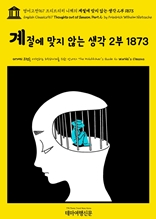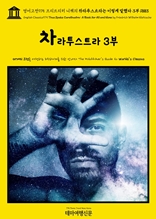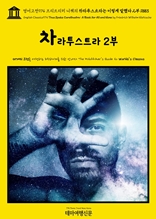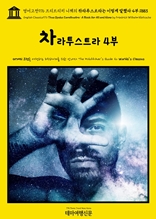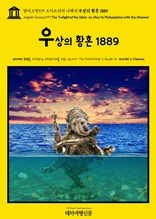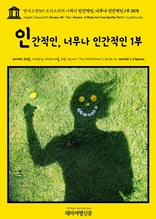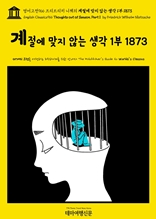영어고전971 프리드리히 니체의 아침놀 1881(English Classics971 The Dawn of Day by Friedrich Wilhelm Nietzsche)
도서정보 : 프리드리히 니체(Friedrich Wilhelm Nietzsche) | 2023-01-31 | EPUB파일
지원기기 : PC / Android / iOS
▶ 아침놀 1881(The Dawn of Day by Friedrich Wilhelm Nietzsche)은 프리드리히 니체(Friedrich Wilhelm Nietzsche, 1844~1900)가 한층 성숙한 도덕적 상대주의(moral relativism)와 문화적 상대주의(cultural relativism)에 대한 비판을 제기하고, 기독교에 대한 비평(critique of Christianity)을 구체화하였으며 힘의 느낌(feeling of power)을 강조한 작품입니다. 제1권(Book I.)부터 제5권(Book V.)까지 크게 다섯 단락을 포괄하고 있으며, 전작과 마찬가지로 짤막한 문장과 단문 575편을 묶은 형태로 구성되어 있습니다. 독자는 이 책을 펼치는 순간 특정한 목차와 상세한 키워드의 안내 없이 방대한 분량의 니체 철학을 헤엄치는 경험을 피할 수 없을 것입니다. 우리말로 아침놀(The Dawn of Day) 혹은 서광(曙光)으로 번역되었으며, 니체의 한국어 번역본 출간작 중 하나. 테마여행신문 TTN Korea 영어고전(English Classics)과 함께 어제도, 오늘도, 내일도 멋진 문학여행을! B
▶ Introduction. When Nietzsche called his book The Dawn of Day, he was far from giving it a merely fanciful title to attract the attention of that large section of the public which judges books by their titles rather than by their contents. The Dawn of Day represents, figuratively, the dawn of Nietzsche's own philosophy. Hitherto he had been considerably influenced in his outlook, if not in his actual thoughts, by Schopenhauer, Wagner, and perhaps also Comte. Human, all-too-Human, belongs to a period of transition.
▷ 서문. 니체가 그의 책을 “아침놀”이라고 불렀을 때, 그는 책을 내용보다는 제목으로 판단하는 대중의 큰 부분의 관심을 끌기 위해 단순히 공상적인 제목을 붙이는 것과는 거리가 멀었습니다. 아침놀은 비유적으로 니체 자신의 철학의 여명을 나타냅니다. 지금까지 그는 쇼펜하우어(Schopenhauer), 바그너(Wagner), 그리고 아마도 콩트(Comte)에 의해 실제 생각은 아니더라도 그의 전망에 상당한 영향을 받았습니다. “인간적인, 너무나도 인간적인”은 과도기에 속합니다.
▶ Author's Preface. In this book we find a “subterrestrial” at work, digging, mining, undermining. You can see him, always provided that you have eyes for such deep work,?how he makes his way slowly, cautiously, gently but surely, without showing signs of the weariness that usually accompanies a long privation of light and air. He might even be called happy, despite his labours in the dark. Does it not seem as if some faith were leading him on, some solace recompensing him for his toil?
▷ 저자 서문. 이 책에서 우리는 땅을 파고, 채굴하고, 땅을 파고 있는 "지하"를 발견합니다. 당신이 그렇게 심오한 일을 할 눈이 있다면 항상 그를 볼 수 있습니다. 그가 빛과 공기의 오랜 결핍에 수반되는 피곤한 기색을 보이지 않고 천천히, 조심스럽게, 부드럽지만 확실하게 자신의 길을 가는 모습을 볼 수 있습니다. 그는 어둠 속에서 수고했음에도 불구하고 행복하다고 불릴 수도 있습니다. 어떤 믿음이 그를 인도하고, 어떤 위안이 그의 수고를 보상하는 것처럼 보이지 않습니까?
▶ 1. Subsequent Judgment.?All things that endure for a long time are little by little so greatly permeated by reason that their origin in unreason becomes improbable. Does not almost every exact statement of an origin strike us as paradoxical and sacrilegious? Indeed, does not the true historian constantly contradict? ▷ 1. 뒤따르는 심판 - 오래 지속되는 모든 것들은 점차적으로 이성에 깊이 스며들기 때문에 그들의 기원이 비이성적일 가능성이 없어집니다. 기원에 대한 거의 모든 정확한 진술이 우리에게 역설적이고 신성 모독적이라고 생각하지 않습니까? 참으로 진정한 역사가는 끊임없이 모순되지 않습니까?
▶ 93. What is Truth??Who will not be pleased with the conclusions which the faithful take such delight in coming to??“Science cannot be true; for it denies God. Hence it does not come from God; and consequently it cannot be true?for God is truth.” It is not the deduction but the premise which is fallacious. What if God were not exactly truth, and if this were proved? And if he were instead the vanity, the desire for power, the ambitions, the fear, and the enraptured and terrified folly of mankind?
▷ 93. 진리란 무엇인가?-신자들이 그토록 기뻐하는 결론에 누가 기뻐하지 않겠습니까?-“과학은 참일 수 없습니다. 그것은 하나님을 부인하기 때문입니다. 그러므로 그것은 하나님에게서 온 것이 아닙니다. 따라서 그것은 참일 수 없습니다. 하나님은 진리이시기 때문입니다.” 오류가 있는 것은 추론이 아니라 전제입니다. 신이 정확히 진리가 아니고 이것이 증명된다면 어떨까요? 그리고 그가 오히려 인류의 허영심, 권력욕, 야망, 공포, 도취되고 겁에 질린 어리석음이라면?
▶ 101. Open to Doubt.?To accept a belief simply because it is customary implies that one is dishonest, cowardly, and lazy.?Must dishonesty, cowardice, and laziness, therefore, be the primary conditions of morality? ▷ 101. 의심의 여지가 있습니다. - 관습적이라는 이유만으로 믿음을 받아들이는 것은 부정직하고, 비겁하고, 게으르다는 의미입니다. - 그러므로 부정직, 비겁함, 게으름이 도덕의 주요 조건이어야 합니까?
▶ 575. And where, then, are we aiming at? Do we wish to cross the sea? whither does this over-powering passion urge us, this passion which we value more highly than any other delight? Why do we fly precisely in this direction, where all the suns of humanity have hitherto set? Is it possible that people may one day say of us that we also steered westward, hoping to reach India?but that it was our fate to be wrecked on the infinite? Or, my brethren? or?? ▷ 575. 그렇다면 우리는 어디를 목표로 하고 있습니까? 우리는 바다를 건너고 싶습니까? 이 압도적인 열정, 우리가 다른 어떤 기쁨보다 더 높이 평가하는 이 열정은 우리를 어디로 재촉합니까? 지금까지 인류의 모든 태양이 지는 바로 이 방향으로 비행하는 이유는 무엇입니까? 언젠가 사람들이 우리도 인도에 도달하기를 바라며 서쪽으로 방향을 틀었지만 무한정에서 파선될 운명이었다고 우리에 대해 말할 수 있습니까? 아니면, 내 형제들? 또는-?
구매가격 : 9,900 원
영어고전964 프리드리히 니체의 우리교육기관의 미래에 대하여 1872(English Classics964 On the Future of our Educational Institutions by Friedrich Wilhelm Nietzsche)
도서정보 : 프리드리히 니체(Friedrich Wilhelm Nietzsche) | 2023-01-31 | EPUB파일
지원기기 : PC / Android / iOS
▶ 우리교육기관의 미래에 대하여 1872(On the Future of our Educational Institutions by Friedrich Wilhelm Nietzsche)는 제목 그대로 프리드리히 니체(Friedrich Wilhelm Nietzsche, 1844~1900)가 교육기관의 미래에 대해 집필한 강의안(Lecture)을 묶은 작품으로 1872년 1월부터 3월까지 전달된 다섯 편의 원고로 구성되어 있습니다. 구두 낭독을 위해 작성된 강의안이기 때문에 모든 원고는 신사 숙녀 여러분(Ladies and Gentlemen)이란 상투적인 문구로 시작하며, 청자를 논리적으로, 또한 감정적으로 자극할 수 있도록 생동감 있는 표현과 단순명료한 구성으로 이루어져 있습니다. 테마여행신문 TTN Korea 영어고전(English Classics)과 함께 어제도, 오늘도, 내일도 멋진 문학여행을! B
▶ 원고에 앞서 실린 서문(Preface.)이 특히 인상적인데 작가 니체가 기대하는 독자의 세 가지 특성(The reader from whom I expect something must possess three qualities)에 관한 구체적인 설명은 비단 해당 작품과 상관없이 읽어볼만한 명문입니다. 작가는 강의안에 앞서서 실린 소개(Introduction.)를 통해 해당 작품에 대한 작가의 의도와 목적을 당대 독일의 교육 제도에 근거하여 일목요연하게 설명하였습니다.
▶ PREFACE. The reader from whom I expect something must possess three qualities: he must be calm and must read without haste; he must not be ever interposing his own personality and his own special "culture"; and he must not expect as the ultimate results of his study of these pages that he will be presented with a set of new formulæ. ▷ 서문. 내가 무언가를 기대하는 독자는 세 가지 특성을 가져야 합니다. 그는 침착해야 하고 서두르지 않고 읽어야 합니다. 그는 결코 자신의 개성과 자신의 특별한 "문화"를 방해해서는 안 됩니다. 그리고 그는 이 페이지들에 대한 연구의 궁극적인 결과로서 새로운 공식이 제시될 것이라고 기대해서는 안 됩니다.
▶ This book is intended for calm readers,?for men who have not yet been drawn into the mad headlong rush of our hurry-skurrying age, and who do not experience any idolatrous delight in throwing themselves beneath its chariot-wheels. It is for men, therefore, who are not accustomed to estimate the value of everything according to the amount of time it either saves or wastes. In short, it is for the few. ▷ 이 책은 침착한 독자들을 위한 것입니다. 즉, 우리가 서두르는 시대의 미친 듯이 돌진하는 것에 아직 빠져들지 않았고, 전차 바퀴 아래로 몸을 던지는 우상적인 기쁨을 경험하지 않은 사람들을 위한 것입니다. 그러므로 모든 것의 가치를 그것이 절약하거나 낭비하는 시간의 양에 따라 평가하는 것에 익숙하지 않은 사람들이 있습니다. 간단히 말해서, 그것은 소수를 위한 것입니다.
▶ The third and most important stipulation is, that he should in no case be constantly bringing himself and his own "culture" forward, after the style of most modern men, as the correct standard and measure of all things. We would have him so highly educated that he could even think meanly of his education or despise it altogether. Only thus would he be able to trust entirely to the author's guidance; for it is only by virtue of ignorance and his consciousness of ignorance, that the latter can dare to make himself heard. Finally, the author would wish his reader to be fully alive to the specific character of our present barbarism and of that which distinguishes us, as the barbarians of the nineteenth century, from other barbarians. ▷ 세 번째이자 가장 중요한 조건은 그가 어떤 경우에도 대부분의 현대 남성의 스타일을 따르고 모든 것의 정확한 기준과 척도로서 자신과 자신의 "문화"를 지속적으로 발전시켜서는 안 된다는 것입니다. 우리는 그가 자신의 교육을 비열하게 생각하거나 경멸할 정도로 그를 고등교육을 받게 할 것입니다. 그래야 저자의 안내를 전적으로 믿을 수 있을 것입니다. 오직 무지와 무지에 대한 그의 의식을 통해서만 후자가 감히 자신의 말을 들을 수 있기 때문입니다. 마지막으로, 저자는 독자들이 우리의 현재 야만성과 19세기의 야만인으로서 다른 야만인들과 구별되는 야만성의 구체적인 특징에 완전히 살아있기를 바랄 것입니다.
▶ INTRODUCTION. The title I gave to these lectures ought, like all titles, to have been as definite, as plain, and as significant as possible; now, however, I observe that owing to a certain excess of precision, in its present form it is too short and consequently misleading. My first duty therefore will be to explain the title, together with the object of these lectures, to you, and to apologise for being obliged to do this. ▷ 소개. 제가 이 강의들에 부여한 제목은 모든 제목들과 마찬가지로 가능한 한 명확하고, 명확하고, 중요해야 했습니다. 하지만, 지금 저는 특정한 과도한 정밀도 때문에 현재 형태로는 너무 짧고 결과적으로 오해의 소지가 있다는 것을 관찰합니다. 그러므로 제 첫 번째 의무는 이 강의의 목적과 함께 제목을 당신에게 설명하고, 이것을 해야만 했던 것에 대해 사과하는 것입니다.
▶ My desire?yea, my very first condition, therefore, would be to become united in spirit with those who have not only thought very deeply upon educational problems, but have also the will to promote what they think to be right by all the means in their power. ▷ 제 소망은, 네, 그러므로, 제 가장 첫 번째 조건은 교육 문제에 대해 매우 깊이 생각했을 뿐만 아니라, 그들의 힘에 있는 모든 수단을 통해 옳다고 생각하는 것을 홍보하려는 의지를 가진 사람들과 정신적으로 단결하는 것입니다.
▶ Now it is only in the spirit of the hope above mentioned that I wish to speak of the future of our educational institutions: and this is the second point in regard to which I must tender an apology from the outset. The "prophet" pose is such a presumptuous one that it seems almost ridiculous to deny that I have the intention of adopting it. ▷ 이제 제가 우리 교육 기관의 미래에 대해 말하고 싶은 것은 위에서 언급한 희망의 정신 뿐입니다. 그리고 이것은 제가 처음부터 사과해야 하는 두 번째 요점입니다. "예언자" 포즈는 너무 주제넘은 것이어서 제가 그것을 채택할 의도가 있다는 것을 부인하는 것은 거의 우스꽝스러워 보입니다.
구매가격 : 9,900 원
영어고전978 프리드리히 니체의 바그너의 경우 1888(English Classics978 The Case of Wagner by Friedrich Wilhelm Nietzsche)
도서정보 : 프리드리히 니체(Friedrich Wilhelm Nietzsche) | 2023-01-31 | EPUB파일
지원기기 : PC / Android / iOS
▶ 바그너의 경우 1888(The Case of Wagner by Friedrich Wilhelm Nietzsche)은 프리드리히 니체(Friedrich Wilhelm Nietzsche, 1844~1900)가 1888년 출판한 독일 작곡가 리하르트 바그너(ichard Wagner, 1813~1883)에 대한 비평으로, 부제는 음악가의 문제(A Musician's Problem). 니체는 독일 작곡가 라히르트 바그너(Richard Wagner, 1813~1883)의 음악관과 작품을 존경하였고, 청년시절에 집필한 비극의 탄생; 또는 헬레니즘과 염세주의 1872(The Birth of Tragedy; or, Hellenism and Pessimism by Friedrich Wilhelm Nietzsche)를 그에게 헌정하기까지 하였으나, 그가 독일의 민족 운동(V?lkisch movement)과 반유대주의(antisemitism)에 심취한 이후 그와의 결별을 선언한 작품입니다. 니체는 바그너의 음악을 전 유럽에 영향을 미친 허무주의(nihilism)이자 광범위한 질병 현상(symptom of a broader "disease")이라고 표현하였습니다. 테마여행신문 TTN Korea 영어고전(English Classics)과 함께 어제도, 오늘도, 내일도 멋진 문학여행을! B
▶ 볼테르 서거 100주년(1878) 기념 니체 헌정작, 자유로운 영혼을 위한 책(A Book for Free Spirits) 인간적인, 너무나 인간적인 1878(Human, All-Too-Human: A Book for Free Spirits by Nietzsche) : 니체는 독일 작곡가 라히르트 바그너(Richard Wagner, 1813~1883)의 음악관과 작품을 존경하였고, 청년시절에 집필한 비극의 탄생; 또는 헬레니즘과 염세주의 1872(The Birth of Tragedy; or, Hellenism and Pessimism by Friedrich Wilhelm Nietzsche)를 그에게 헌정하기까지 하였습니다만 바그너의 낭만주의 음악(Romantic music)을 계기로 자신만의 사상을 추구하기 시작하였습니다. 인간적인, 너무나 인간적인 1878은 니체가 바그너의 낭만주의적 허무주의를 벗어나 프랑스 계몽철학자 볼테르(Fran?ois-Marie Arouet, 1694~1778)의 자유정신에 매료되기 시작한 분기점이라는 점에서 주목할 가치가 있으며, 볼테르 서거 100주년을 기념해 1878년 헌정한 바 있습니다. 니체의 자유정신에 대한 사상은 5년 후 발표한 차라투스트라는 이렇게 말했다 1883(Thus Spake Zarathustra: A Book for All and None by Friedrich Wilhelm Nietzsche)에서 한층 성숙된 형태로 제시됩니다.
▶ Translator's Preface. Nietzsche's ambition, throughout his life, was to regenerate European culture. In the first period of his relationship with Wagner, he thought that he had found the man who was prepared to lead in this direction. For a long while he regarded his master as the Saviour of Germany, as the innovator and renovator who was going to arrest the decadent current of his time and lead men to a greatness which had died with antiquity. ▷ 번역가 서문. 니체의 평생 야망은 유럽 문화를 재생하는 것이었습니다. 바그너와의 관계 초기에 그는 이러한 방향으로 이끌 준비가 된 사람을 찾았다고 생각했습니다. 오랫동안 그는 그의 주인을 독일의 구세주로, 퇴폐적인 시대의 흐름을 저지하고 사람들을 고대와 함께 사라진 위대함으로 이끌 혁신가이자 혁신가로 여겼습니다.
▶ In Wagner's music, in his doctrine, in his whole concept of art, Nietzsche saw the confirmation, the promotion?aye, even the encouragement, of that decadence and degeneration which is now rampant in Europe; and it is for this reason, although to the end of his life he still loved Wagner, the man and the friend, that we find him, on the very eve of his spiritual death, exhorting us to abjure Wagner the musician and the artist. ▷ 바그너의 음악에서, 그의 교리에서, 그의 예술에 대한 전체 개념에서 니체는 현재 유럽에서 만연하고 있는 퇴폐와 타락의 확증, 촉진, 심지어 격려까지 보았습니다. 그리고 이런 이유로 그는 비록 그의 삶이 끝날 때까지 인간이자 친구인 바그너를 여전히 사랑했지만, 우리는 그가 그의 영적 죽음 직전에 음악가이자 예술가인 바그너를 포기하라고 우리에게 권고하는 것을 발견합니다.
▶ Preface To The Third Edition. That Wagner, too, was a great sufferer, there can be no doubt; not, however, a sufferer from strength, like a true artist, but from weakness?the weakness of his age, which he never overcame. It is for this reason that he should be rather pitied than judged as he is now being judged by his German and English critics, who, with thoroughly neurotic suddenness, have acknowledged their revulsion of feeling a little too harshly. ▷ 제3판 서문. 바그너 역시 큰 고통을 겪었다는 것은 의심의 여지가 없습니다. 그러나 그는 진정한 예술가처럼 강인함이 아니라 약점, 즉 그가 결코 극복하지 못한 나이의 약점으로 고통 받는 사람입니다. 독일과 영국 비평가들에 의해 완전히 신경증적인 갑작스런 감정에 대한 반감이 너무 가혹함을 인정하면서 지금 그를 평가하고 있기 때문에 그가 평가받기보다는 오히려 불쌍히 여겨야 하는 이유입니다.
▶ Preface. I am writing this to relieve my mind. It is not malice alone which makes me praise Bizet at the expense of Wagner in this essay... Nobody, perhaps, had ever been more dangerously involved in Wagnerism, nobody had defended himself more obstinately against it, nobody had ever been so overjoyed at ridding himself of it. A long history!?Shall I give it a name??If I were a moralist, who knows what I might not call it! Perhaps a piece of self-mastery.?But the philosopher does not like the moralist, neither does he like high-falutin' words.… ▷ 머리말. 마음을 달래기 위해 이 글을 씁니다. 내가 이 에세이에서 바그너를 희생시키면서 비제를 찬양하게 만드는 것은 악의만이 아닙니다... 아마도 아무도 바그너주의에 더 위험하게 관여한 적이 없었고, 아무도 그것에 대해 더 완고하게 자신을 방어하지 않았으며, 아무도 자신을 제거합니다. 긴 역사!?이름을 지어줄까요??내가 도덕주의자라면 무엇을 부르지 않을지 누가 알겠습니까! 아마도 자제력의 일부일 것입니다. 그러나 철학자는 도덕주의자를 좋아하지 않으며 고약한 말을 좋아하지도 않습니다.…
구매가격 : 9,900 원
영어고전967 프리드리히 니체의 계절에 맞지 않는 생각 2부 1873(English Classics967 Thoughts Out of Season, Part II by Friedrich Wilhelm Nietzsche)
도서정보 : 프리드리히 니체(Friedrich Wilhelm Nietzsche) | 2023-01-31 | EPUB파일
지원기기 : PC / Android / iOS
▶ 프리드리히 니체의 계절에 맞지 않는 생각 1873(Thoughts out of Season by Friedrich Wilhelm Nietzsche) 혹은 유행에 뒤떨어진 관찰과 계절에 맞지 않은 생각(Unfashionable Observations and Thoughts Out of Season)은 프리드리히 니체(Friedrich Wilhelm Nietzsche, 1844~1900)가 1873년부터 1876년 사이에 집필한 네 편의 작품을 묶은 편집본으로 각각의 에세이는 10여 편으로 분절되어 있습니다. 니체의 유고 노트에 따르면, 그는 총 13개의 주제(The Cultural Philistine, History, The Philosopher, The Scholar, Art, The Teacher, Religion, State War Nation, The Press, Natural Science, Folk Society, Commerce, Language)로 에세이를 기획하였으나, 생전에 완성한 것이 바로 본서에 실린 네 작품입니다.
▶ 각각의 원고는 서로 독립된 작품이지만, 크게 유럽의 현대적인 조건(the contemporary condition of European)이란 주제로 포괄할 수 있으며, 특히 독일 문화에 초점이 맞춰져 있습니다. 이후 출간된 다섯 번째 에세이는 우리 문헌학자들 1874(We Philologists by Friedrich Wilhelm Nietzsche)이란 제목으로 별도로 출간되었으며, 함께 읽어시면 더욱 좋습니다. 테마여행신문 TTN Korea 영어고전(English Classics)과 함께 어제도, 오늘도, 내일도 멋진 문학여행을! B
▶ 생명을 위한 역사의 이용과 남용에 대하여(The Use And Abuse Of History, 1874)는 니체가 역사를 읽는 대안적인 방법(an alternative way of reading history)을 설명한 작품으로 고전적인 휴머니즘(the basic precepts of classic humanism)에 반하는 엘리트주의(elitism)에 기반하고 있습니다. 인류의 대다수(the majoritarian mass of humanity)에 기반을 둔 민주적 근대성(demotic modernity)을 지지하고, 위대한 개인(great individuals)을 신뢰하는 독자와 비평가들에게 불편한 작품이 아닐 수 없습니다.
▶ Are we to continue to work for these creations and write history from the standpoint of the masses; to look for laws in it, to be deduced from the needs of the masses, the laws of motion of the lowest loam and clay strata of society? ▷ 우리는 이러한 창조물을 위해 계속 일하고 대중의 관점에서 역사를 쓸 것인가? 그 안에서 법을 찾고 대중의 필요, 사회의 가장 낮은 양토와 점토층의 운동 법칙에서 추론하려면?
▶ The masses seem to be worth notice in three aspects only: first as the copies of great men, printed on bad paper from worn-out plates, next as a contrast to the great men, and lastly as their tools: for the rest, let the devil and statistics fly away with them! How could statistics prove that there are laws in history? Laws? Yes, they may prove how common and abominably uniform the masses are: and should we call the effects of leaden folly, imitation, love and hunger?laws? We may admit it: but we are sure of this too?that so far as there are laws in history, the laws are of no value and the history of no value either.
▷ 대중은 세 가지 측면에서만 주목할 가치가 있는 것 같습니다. 첫 번째는 낡은 판에서 나쁜 종이에 인쇄된 위인의 사본으로, 다음으로 위인과의 대조, 마지막으로 그들의 도구입니다. 악마와 통계는 그들과 함께 날아갑니다! 통계는 역사에 법칙이 있다는 것을 어떻게 증명할 수 있습니까? 법률? 예, 그것들은 대중이 얼마나 일반적이고 끔찍할 정도로 획일적인지를 증명할 수 있습니다. 우리는 어리석음, 모방, 사랑, 굶주림의 결과를 법이라고 부를까요? 우리는 그것을 인정할 수 있습니다. 그러나 우리는 이것 역시 확신합니다. 역사에 법칙이 있는 한, 법칙은 가치가 없으며 역사도 가치가 없습니다.
▶ 교육자로서의 쇼펜하우어(Schopenhauer As Educator, 1874) : 니체는 비관주의(pessimism)로 유명한 독일 철학자 아르투어 쇼펜하우어(Arthur Schopenhauer, 1788~1860)의 다른 면모 ? 명랑함(cheerfulness), 개인주의(individualism), 정직함(honesty), 확고함(steadfastness) 등 다양한 미덕에도 주목하였습니다. 무엇보다 쇼펜하우어의 철학적 천재성(the philosophic genius of Schopenhauer)이야말로 독일 문화를 부활(a resurgence of German culture)시킬 수 있는 촉매제라고 주장하였습니다.
▶ When the traveller, who had seen many countries and nations and continents, was asked what common attribute he had found everywhere existing among men, he answered, “They have a tendency to sloth.” Many may think that the fuller truth would have been, “They are all timid.” They hide themselves behind “manners” and “opinions.” At bottom every man knows well enough that he is a unique being, only once on this earth; and by no extraordinary chance will such a marvellously picturesque piece of diversity in unity as he is, ever be put together a second time.
▷ 많은 나라와 대륙을 본 여행자가 사람들 사이에 어디에나 존재하는 공통점이 무엇인지 묻자, 그는 "그들은 게으름을 피우는 경향이 있습니다."라고 대답했습니다. 많은 사람들은 더 완전한 진실이 "그들은 모두 소심하군요."였을 것이라고 생각할 수 있습니다 그들은 "매너"와 "의견" 뒤에 자신을 숨깁니다. 근본적으로 모든 사람은 자신이 이 지구상에서 단 한 번뿐인 유일한 존재라는 것을 충분히 잘 알고 있습니다. 그리고 그처럼 놀라운 통일성의 다양성 조각은 결코 두 번째로 합쳐지지 않을 것입니다.
구매가격 : 9,900 원
영어고전975 프리드리히 니체의 차라투스트라는 이렇게 말했다 3부 1883(English Classics975 Thus Spake Zarathustra: A Book for All and None by Friedrich Wilhelm Nietzsche)
도서정보 : 프리드리히 니체(Friedrich Wilhelm Nietzsche) | 2023-01-31 | EPUB파일
지원기기 : PC / Android / iOS
▶ 차라투스트라는 이렇게 말했다 1883(Thus Spake Zarathustra: A Book for All and None by Friedrich Wilhelm Nietzsche)은 프리드리히 니체(Friedrich Wilhelm Nietzsche, 1844~1900)가 1883년부터 1885년 사이에 집필한 철학서이자 철학적 소설(a work of philosophical fiction)입니다. 차라투스트라(Zarathustra)에서 따온 것으로 현재의 이란 북부에서 활동한 예언자이자 조로아스터교의 창시자로, 소설의 주인공이자 실존 인물입니다. 조로아스터교는 종교이자 철학으로써 서구문명에 지대한 영향을 미쳤으며, 니체는 차라투스트라가 정립한 종교 윤리 체계 - 마즈다야스나(Mazdayasna)를 비판함으로써 기독교적 이분법 세계관의 모순을 비판하고자 그의 이름을 빌린 즐거운 학문 1882{The Joyful Wisdom("La Gaya Scienza")}, 차라투스트라는 이렇게 말했다 1883 등을 집필하였습니다. 작가의 의도는 모두를 위한 책이자 아무도 위하지 않는 책(A Book for All and None)란 광오한 부제에서도 짐작하실 수 있을 것입니다.
▷ 크게 제4장으로 구성되어 있으며, 니체 철학을 대표하는 권력에의 의지(Will to power), 기독교에 대한 비판(Criticism of religion), 허무주의(Nihilism)를 비롯해 신은 죽었다(Gott ist tott, 1882), 영원 회귀(永遠回歸, Ewige Wiederkunft, Eternal return, 1885), 위버멘쉬(?bermensch, 1885) 등에 대한 개념적 고찰을 만나실 수 있습니다. 작품의 인기와 함께 니체가 사망한 1900년 스위스 실스 호수(Lake Sils)에 세워진 니체 기념비에 차라투스트라는 이렇게 말했다 1883의 한 구절이 새겨졌으며, 그의 작품에 영감을 받아 리하르트 슈트라우스(Richard Strauss, 1864~1949)의 교향시 Also sprach Zarathustra, Op. 30, 프레더릭 딜리어스(Frederick Delius, 1862~1934)의 오페라 A Mass of Life(1904~1905) 등으로 탄생한 바 있습니다. 테마여행신문 TTN Korea 영어고전(English Classics)과 함께 어제도, 오늘도, 내일도 멋진 문학여행을! B
▶ 제3부(Third Part.) : 차라투스트라의 수행은 길 위에서도 멈추지 않습니다. 중력의 영(the spirit of gravity)이 속삭이는 목소리를 물리치고, 심연의 생각(abysmal thought)에 빠져드는 동시에 영원히 반복되는 영원 회귀(永遠回歸, Ewige Wiederkunft, Eternal return, 1885)의 논리에 여념이 없습니다. 뱀이 목구멍을 파고들어 질식하기 직전인 양치기를 만나, 그 뱀을 물어뜯으라고 조언하는데……. 과연 양치기의 운명은?!
▶ XLV. THE WANDERER. Then, when it was about midnight, Zarathustra went his way over the ridge of the isle, that he might arrive early in the morning at the other coast; because there he meant to embark. For there was a good roadstead there, in which foreign ships also liked to anchor: those ships took many people with them, who wished to cross over from the Happy Isles. So when Zarathustra thus ascended the mountain, he thought on the way of his many solitary wanderings from youth onwards, and how many mountains and ridges and summits he had already climbed. ▷ 제45장. 방랑자. 그리고 자정쯤 되었을 때 차라투스트라는 아침 일찍 다른 해안에 도착하기 위해 섬의 능선을 넘어갔습니다. 그곳에서 그는 승선하려 했기 때문입니다. 거기에는 외국 선박들도 정박하기를 좋아하는 좋은 정박지가 있었기 때문입니다. 그 배들은 행복한 섬에서 건너고 싶어 하는 많은 사람들을 데려갔습니다. 그래서 차라투스트라가 이렇게 산에 올랐을 때, 그는 젊었을 때부터 수많은 고독한 방황의 길과 그가 이미 얼마나 많은 산과 능선과 봉우리를 올라갔는지 생각했습니다.
▶ INTRODUCTION BY MRS FORSTER-NIETZSCHE. HOW ZARATHUSTRA CAME INTO BEING. “Zarathustra” is my brother’s most personal work; it is the history of his most individual experiences, of his friendships, ideals, raptures, bitterest disappointments and sorrows. Above it all, however, there soars, transfiguring it, the image of his greatest hopes and remotest aims. My brother had the figure of Zarathustra in his mind from his very earliest youth: he once told me that even as a child he had dreamt of him. ▷ 미세스 포스터-니체의 소개문. 차라투스트라는 어떻게 탄생하게 되었는가. "차라투스트라"는 내 동생의 가장 개인적인 작품입니다. 그것은 그의 가장 개인적인 경험, 그의 우정, 이상, 환희, 가장 쓰라린 실망과 슬픔의 역사입니다. 그러나 무엇보다도 그의 가장 큰 희망과 가장 먼 목표의 이미지가 솟아 오르고 변형됩니다. 내 형은 아주 어린 시절부터 차라투스트라의 모습을 마음속에 품고 있었습니다.
▶ The notion of rearing the Superman is only a new form of an ideal Nietzsche already had in his youth, that “THE OBJECT OF MANKIND SHOULD LIE IN ITS HIGHEST INDIVIDUALS” (or, as he writes in “Schopenhauer as Educator”: “Mankind ought constantly to be striving to produce great men?this and nothing else is its duty.”) ▷ 초인을 양육한다는 개념은 "인류의 목적은 가장 높은 개인에게 있어야 한다."(또는 그가 "교육자로서의 쇼펜하우어"에서 다음과 같이 썼듯이) 니체가 이미 젊었을 때 가졌던 새로운 형태의 이상적인 것일 뿐입니다. 위대한 사람을 배출하기 위해 끊임없이 노력하는 것, 이것이 의무입니다.”)
▶ People have never asked me, as they should have done, what the name Zarathustra precisely means in my mouth, in the mouth of the first Immoralist; for what distinguishes that philosopher from all others in the past is the very fact that he was exactly the reverse of an immoralist. Zarathustra was the first to see in the struggle between good and evil the essential wheel in the working of things. ▷ 사람들은 제 입에서, 최초의 부도덕주의자의 입에서 차라투스트라라는 이름이 정확히 무엇을 의미하는지 제게 묻지 않았습니다. 그 철학자를 과거의 모든 다른 철학자들과 구별하는 것은 그가 비도덕주의자의 정반대였다는 바로 그 사실입니다. 차라투스트라는 선과 악 사이의 투쟁에서 사물의 작동에 있어 본질적인 바퀴를 본 최초의 사람이었습니다.
구매가격 : 9,900 원
영어고전974 프리드리히 니체의 차라투스트라는 이렇게 말했다 2부 1883(English Classics974 Thus Spake Zarathustra: A Book for All and None by Friedrich Wilhelm Nietzsche)
도서정보 : 프리드리히 니체(Friedrich Wilhelm Nietzsche) | 2023-01-31 | EPUB파일
지원기기 : PC / Android / iOS
▶ 차라투스트라는 이렇게 말했다 1883(Thus Spake Zarathustra: A Book for All and None by Friedrich Wilhelm Nietzsche)은 프리드리히 니체(Friedrich Wilhelm Nietzsche, 1844~1900)가 1883년부터 1885년 사이에 집필한 철학서이자 철학적 소설(a work of philosophical fiction)입니다. 차라투스트라(Zarathustra)에서 따온 것으로 현재의 이란 북부에서 활동한 예언자이자 조로아스터교의 창시자로, 소설의 주인공이자 실존 인물입니다. 조로아스터교는 종교이자 철학으로써 서구문명에 지대한 영향을 미쳤으며, 니체는 차라투스트라가 정립한 종교 윤리 체계 - 마즈다야스나(Mazdayasna)를 비판함으로써 기독교적 이분법 세계관의 모순을 비판하고자 그의 이름을 빌린 즐거운 학문 1882{The Joyful Wisdom("La Gaya Scienza")}, 차라투스트라는 이렇게 말했다 1883 등을 집필하였습니다. 작가의 의도는 모두를 위한 책이자 아무도 위하지 않는 책(A Book for All and None)란 광오한 부제에서도 짐작하실 수 있을 것입니다.
▷ 크게 제4장으로 구성되어 있으며, 니체 철학을 대표하는 권력에의 의지(Will to power), 기독교에 대한 비판(Criticism of religion), 허무주의(Nihilism)를 비롯해 신은 죽었다(Gott ist tott, 1882), 영원 회귀(永遠回歸, Ewige Wiederkunft, Eternal return, 1885), 위버멘쉬(?bermensch, 1885) 등에 대한 개념적 고찰을 만나실 수 있습니다. 작품의 인기와 함께 니체가 사망한 1900년 스위스 실스 호수(Lake Sils)에 세워진 니체 기념비에 차라투스트라는 이렇게 말했다 1883의 한 구절이 새겨졌으며, 그의 작품에 영감을 받아 리하르트 슈트라우스(Richard Strauss, 1864~1949)의 교향시 Also sprach Zarathustra, Op. 30, 프레더릭 딜리어스(Frederick Delius, 1862~1934)의 오페라 A Mass of Life(1904~1905) 등으로 탄생한 바 있습니다. 테마여행신문 TTN Korea 영어고전(English Classics)과 함께 어제도, 오늘도, 내일도 멋진 문학여행을! B
▶ 제2부, 차라투스트라는 이렇게 말했다.(Thus Spake Zarathustra, Second Part.) : 차라투스트라는 마을의 서커스장에서 겪은 충격으로 다시 산 속의 동굴에서 은둔 생활을 시작합니다. 어느 날 문득 바라본 거울에서 악마의 얼굴을 목도한 그는 다시 한 번 용기를 얻어 그가 저버린 제자들을 다시 찾기 위해 속세로 향하는데……. 신의 죽음(the death of God)과 이를 극복하기 위한 위버멘쉬(?bermensch)에 대한 탐구, 권력 의지에 대한 개념(concept of the will to power)에 대한 열정은 과연 그를 어디로 이끌 것인가?
▶ XXIII. THE CHILD WITH THE MIRROR. After this Zarathustra returned again into the mountains to the solitude of his cave, and withdrew himself from men, waiting like a sower who hath scattered his seed. His soul, however, became impatient and full of longing for those whom he loved: because he had still much to give them. For this is hardest of all: to close the open hand out of love, and keep modest as a giver. ▷ 제23장. 거울을 가진 아이. 이 일이 있은 후 차라투스트라는 다시 산으로 돌아와 그의 동굴의 외딴 곳으로 갔고, 사람들에게서 물러나 씨를 뿌리는 씨 뿌리는 사람처럼 기다렸습니다. 그러나 그의 영혼은 그가 사랑하는 자들에 대한 갈망과 조급함으로 가득 찼습니다. 왜냐하면 그가 그들에게 줄 것이 아직도 많기 때문입니다. 무엇보다도 이것이 가장 어려운 일이니, 사랑의 손을 주는 사람으로서 겸허함을 유지하는 것입니다.
▶ INTRODUCTION BY MRS FORSTER-NIETZSCHE. HOW ZARATHUSTRA CAME INTO BEING. “Zarathustra” is my brother’s most personal work; it is the history of his most individual experiences, of his friendships, ideals, raptures, bitterest disappointments and sorrows. Above it all, however, there soars, transfiguring it, the image of his greatest hopes and remotest aims. My brother had the figure of Zarathustra in his mind from his very earliest youth: he once told me that even as a child he had dreamt of him. ▷ 미세스 포스터-니체의 소개문. 차라투스트라는 어떻게 탄생하게 되었는가. "차라투스트라"는 내 동생의 가장 개인적인 작품입니다. 그것은 그의 가장 개인적인 경험, 그의 우정, 이상, 환희, 가장 쓰라린 실망과 슬픔의 역사입니다. 그러나 무엇보다도 그의 가장 큰 희망과 가장 먼 목표의 이미지가 솟아 오르고 변형됩니다. 내 형은 아주 어린 시절부터 차라투스트라의 모습을 마음속에 품고 있었습니다.
▶ The notion of rearing the Superman is only a new form of an ideal Nietzsche already had in his youth, that “THE OBJECT OF MANKIND SHOULD LIE IN ITS HIGHEST INDIVIDUALS” (or, as he writes in “Schopenhauer as Educator”: “Mankind ought constantly to be striving to produce great men?this and nothing else is its duty.”) ▷ 초인을 양육한다는 개념은 "인류의 목적은 가장 높은 개인에게 있어야 한다."(또는 그가 "교육자로서의 쇼펜하우어"에서 다음과 같이 썼듯이) 니체가 이미 젊었을 때 가졌던 새로운 형태의 이상적인 것일 뿐입니다. 위대한 사람을 배출하기 위해 끊임없이 노력하는 것, 이것이 의무입니다.”)
▶ People have never asked me, as they should have done, what the name Zarathustra precisely means in my mouth, in the mouth of the first Immoralist; for what distinguishes that philosopher from all others in the past is the very fact that he was exactly the reverse of an immoralist. Zarathustra was the first to see in the struggle between good and evil the essential wheel in the working of things. ▷ 사람들은 제 입에서, 최초의 부도덕주의자의 입에서 차라투스트라라는 이름이 정확히 무엇을 의미하는지 제게 묻지 않았습니다. 그 철학자를 과거의 모든 다른 철학자들과 구별하는 것은 그가 비도덕주의자의 정반대였다는 바로 그 사실입니다. 차라투스트라는 선과 악 사이의 투쟁에서 사물의 작동에 있어 본질적인 바퀴를 본 최초의 사람이었습니다.
구매가격 : 9,900 원
영어고전976 프리드리히 니체의 차라투스트라는 이렇게 말했다 4부 1883(English Classics976 Thus Spake Zarathustra: A Book for All and None by Friedrich Wilhelm Nietzsche)
도서정보 : 프리드리히 니체(Friedrich Wilhelm Nietzsche) | 2023-01-31 | EPUB파일
지원기기 : PC / Android / iOS
▶ 차라투스트라는 이렇게 말했다 1883(Thus Spake Zarathustra: A Book for All and None by Friedrich Wilhelm Nietzsche)은 프리드리히 니체(Friedrich Wilhelm Nietzsche, 1844~1900)가 1883년부터 1885년 사이에 집필한 철학서이자 철학적 소설(a work of philosophical fiction)입니다. 차라투스트라(Zarathustra)에서 따온 것으로 현재의 이란 북부에서 활동한 예언자이자 조로아스터교의 창시자로, 소설의 주인공이자 실존 인물입니다. 조로아스터교는 종교이자 철학으로써 서구문명에 지대한 영향을 미쳤으며, 니체는 차라투스트라가 정립한 종교 윤리 체계 - 마즈다야스나(Mazdayasna)를 비판함으로써 기독교적 이분법 세계관의 모순을 비판하고자 그의 이름을 빌린 즐거운 학문 1882{The Joyful Wisdom("La Gaya Scienza")}, 차라투스트라는 이렇게 말했다 1883 등을 집필하였습니다. 작가의 의도는 모두를 위한 책이자 아무도 위하지 않는 책(A Book for All and None)란 광오한 부제에서도 짐작하실 수 있을 것입니다.
▷ 크게 제4장으로 구성되어 있으며, 니체 철학을 대표하는 권력에의 의지(Will to power), 기독교에 대한 비판(Criticism of religion), 허무주의(Nihilism)를 비롯해 신은 죽었다(Gott ist tott, 1882), 영원 회귀(永遠回歸, Ewige Wiederkunft, Eternal return, 1885), 위버멘쉬(?bermensch, 1885) 등에 대한 개념적 고찰을 만나실 수 있습니다. 작품의 인기와 함께 니체가 사망한 1900년 스위스 실스 호수(Lake Sils)에 세워진 니체 기념비에 차라투스트라는 이렇게 말했다 1883의 한 구절이 새겨졌으며, 그의 작품에 영감을 받아 리하르트 슈트라우스(Richard Strauss, 1864~1949)의 교향시 Also sprach Zarathustra, Op. 30, 프레더릭 딜리어스(Frederick Delius, 1862~1934)의 오페라 A Mass of Life(1904~1905) 등으로 탄생한 바 있습니다. 테마여행신문 TTN Korea 영어고전(English Classics)과 함께 어제도, 오늘도, 내일도 멋진 문학여행을! B
▶ 제4부이자 마지막 장(Fourth And Last Part.) : 다시 동굴로 회귀한 차라투스트라는 자신이 어느새 청춘을 잃었음을, 늙었음을 실감합니다. 그의 동굴로 찾아온 예언자(soothsayer)의 감언이설은 그가 세상의 위버멘쉬(?bermensch)를 찾아 다시 한 번 방황하게 만드는데……. 과연 차라투스트라는 자신과 마주친 이들을 자신의 동굴에서 다시 한 번 만날 수 있도록 초대하는데 성공할 수 있을까요? 어디선가 들려오는 고통의 외침(the cry of distress)은 누구의 목소리일까요? 난데없이 나타난 사자(a lion)와 비둘기 떼(a flock of doves)는 과연 어떤 의미일까요? 과연 차라투스트라는 예언자가 지적한 연민(mitleiden)이란 죄악로부터 벗어나 진정한 초인이 될 수 있을 것인가?
▶ LXI. THE HONEY SACRIFICE. “O Zarathustra,” said they, “gazest thou out perhaps for thy happiness?”?“Of what account is my happiness!” answered he, “I have long ceased to strive any more for happiness, I strive for my work.”?“O Zarathustra,” said the animals once more, “that sayest thou as one who hath overmuch of good things. Liest thou not in a sky-blue lake of happiness?”?“Ye wags,” answered Zarathustra, and smiled, “how well did ye choose the simile! But ye know also that my happiness is heavy, and not like a fluid wave of water: it presseth me and will not leave me, and is like molten pitch.” ▷ 제61장. 달콤한 희생. "오 차라투스트라여, 당신은 당신의 행복을 바라보고 있습니까?" "나는 더 이상 행복을 위해 애쓰지 않고 내 일을 위해 애쓰노라." 동물들이 다시 말했습니다. 너는 하늘색 행복의 호수에 누워 있지 않느냐?” ? “너희는 흔든다.”라고 차라투스트라는 대답하고 미소 지었습니다. 그러나 너희도 알거니와 내 행복이 무겁고 물결치는 물 같지 아니하고 나를 누르고 떠나지 아니하며 녹은 송지 같도다.”
▶ INTRODUCTION BY MRS FORSTER-NIETZSCHE. HOW ZARATHUSTRA CAME INTO BEING. “Zarathustra” is my brother’s most personal work; it is the history of his most individual experiences, of his friendships, ideals, raptures, bitterest disappointments and sorrows. Above it all, however, there soars, transfiguring it, the image of his greatest hopes and remotest aims. My brother had the figure of Zarathustra in his mind from his very earliest youth: he once told me that even as a child he had dreamt of him. ▷ 미세스 포스터-니체의 소개문. 차라투스트라는 어떻게 탄생하게 되었는가. "차라투스트라"는 내 동생의 가장 개인적인 작품입니다. 그것은 그의 가장 개인적인 경험, 그의 우정, 이상, 환희, 가장 쓰라린 실망과 슬픔의 역사입니다. 그러나 무엇보다도 그의 가장 큰 희망과 가장 먼 목표의 이미지가 솟아 오르고 변형됩니다. 내 형은 아주 어린 시절부터 차라투스트라의 모습을 마음속에 품고 있었습니다.
▶ The notion of rearing the Superman is only a new form of an ideal Nietzsche already had in his youth, that “THE OBJECT OF MANKIND SHOULD LIE IN ITS HIGHEST INDIVIDUALS” (or, as he writes in “Schopenhauer as Educator”: “Mankind ought constantly to be striving to produce great men?this and nothing else is its duty.”) ▷ 초인을 양육한다는 개념은 "인류의 목적은 가장 높은 개인에게 있어야 한다."(또는 그가 "교육자로서의 쇼펜하우어"에서 다음과 같이 썼듯이) 니체가 이미 젊었을 때 가졌던 새로운 형태의 이상적인 것일 뿐입니다. 위대한 사람을 배출하기 위해 끊임없이 노력하는 것, 이것이 의무입니다.”)
▶ People have never asked me, as they should have done, what the name Zarathustra precisely means in my mouth, in the mouth of the first Immoralist; for what distinguishes that philosopher from all others in the past is the very fact that he was exactly the reverse of an immoralist. Zarathustra was the first to see in the struggle between good and evil the essential wheel in the working of things. ▷ 사람들은 제 입에서, 최초의 부도덕주의자의 입에서 차라투스트라라는 이름이 정확히 무엇을 의미하는지 제게 묻지 않았습니다. 그 철학자를 과거의 모든 다른 철학자들과 구별하는 것은 그가 비도덕주의자의 정반대였다는 바로 그 사실입니다. 차라투스트라는 선과 악 사이의 투쟁에서 사물의 작동에 있어 본질적인 바퀴를 본 최초의 사람이었습니다.
구매가격 : 9,900 원
영어고전979 프리드리히 니체의 우상의 황혼 1889(English Classics979 The Twilight of the Idols; or, How to Philosophize with the Hammer by Friedrich Wilhelm Nietzsche)
도서정보 : 프리드리히 니체(Friedrich Wilhelm Nietzsche) | 2023-01-31 | EPUB파일
지원기기 : PC / Android / iOS
▶ 우상의 황혼 1889(The Twilight of the Idols; or, How to Philosophize with the Hammer by Friedrich Wilhelm Nietzsche)는 프리드리히 니체(Friedrich Wilhelm Nietzsche, 1844~1900)가 1889년 정신병원에 입원하기 직전 해인 1888년 집필한 작품으로 차라투스트라는 이렇게 말했다 1883(Thus Spake Zarathustra: A Book for All and None), 선악의 저편 1886(Beyond Good and Evil), 도덕의 계보 1887(The Genealogy of Morals) 등과 함께 그의 후기 저작에 속합니다. 니체는 1888년에만 바그너의 경우(The Case of Wagner)부터 우상의 황혼(The Twilight of the Idols)과 안티크리스트(적그리스도)(The Antichrist)까지 세 권의 저서를 집필하며, 현재까지도 불타오르는 철학의 열정을 찬란하게 피워 올렸습니다.
▶ 우상의 황혼 1889는 니체가 스위스의 한적한 소도시 실스 임 엥가딘/실(Sils im Engadin/Segl)로 휴가를 떠난 1888년 8월 26일부터 9월 3일까지, 매우 짧은 기간에 자신의 기존 저서와 철학, 사상을 바탕으로 압축해 집필한 작품입니다. 현재까지도 실스에는 니체가 1881년부터 1888년까지 여름휴가를 떠난 니체의 집(Nietzsche-Haus)이 잘 보존되어 있습니다.
▶ 우상의 황혼(The Twilight of the Idols)이란 책 제목은 리하르트 바그너(Richard Wagner, 1813~1883)의 오페라 신들의 황혼(G?tterd?mmerung, Twilight of the Gods)의 패러디이며, 쇠망치로 철학을 하는 법(How to Philosophize with the Hammer)란 부제는 훗날 니체의 별칭 망치를 든 철학자(philosopher with a hammer)의 유래가 되었습니다.
▶ 니체는 서구 전통의 형이상학과 기독교적 가치관에서 오랫동안 무비판적으로 숭배해온 우상이 더 이상 유효하지 않은, 즉 황혼 상태임을 지적하면서 인간의 이성이란 쇠망치(Hammer)로 이를 부숴야 한다고 설파하였습니다. 잠언과 미사일(Maxims And Missiles)을 시작으로 "차라투스트라는 이렇게 말했다"에 대한 영원회귀와 해설(The Eternal Recurrence And Explanatory Notes To “Thus Spake Zarathustra.”)까지 총 12개의 챕터로 구성되어 있으며, 단계별로 소크라테스로 대변되는 서양 전통의 형이상학, 감각과 본능을 무시하는 이성중심주의, 내면의 열정을 간과한 전통도덕이란 도덕적 괴물(Moral-Unthiere)을 조목조목 비판하였습니다. 우리말로 옮긴 목차는 다음과 같습니다. 테마여행신문 TTN Korea 영어고전(English Classics)과 함께 어제도, 오늘도, 내일도 멋진 문학여행을! B
▷ 잠언과 미사일(Maxims And Missiles)
▷ 소크라테스의 문제(The Problem Of Socrates)
▷ 철학에서의 이성(“Reason” In Philosophy)
▷ "참된 세계"가 궁극적으로 우화가 된 방법: 오류의 역사(How The “True World” Ultimately Became A Fable : The History Of An Error)
▷ 반자연으로서의 도덕(Morality As The Enemy Of Nature)
▷ 4대 오류(The Four Great Errors)
▷ 인류의 “개량자”(The “Improvers” Of Mankind)
▷ 독일인에게 부족한 것들(Things The Germans Lack)
▷ 시대와의 전쟁 속 쟁탈전(Skirmishes In A War With The Age)
▷ 내가 고대인에게 빚진 것들(Things I Owe To The Ancients)
▷ 안티크리스트(The Antichrist)
▷ "차라투스트라는 이렇게 말했다"에 대한 영원회귀와 해설(The Eternal Recurrence And Explanatory Notes To “Thus Spake Zarathustra.”)
▶ PREFACE. Even this treatise?as its title shows?is above all a recreation, a ray of sunshine, a leap sideways of a psychologist in his leisure moments. Maybe, too, a new war? And are we again cross-examining new idols? This little work is a great declaration of war; and with regard to the cross-examining of idols, this time it is not the idols of the age but eternal idols which are here struck with a hammer as with a tuning fork,?there are certainly no idols which are older, more convinced, and more inflated.
▷ 머리말. 제목에서 알 수 있듯이 이 논문조차도 무엇보다도 여가 시간에 심리학자가 옆으로 도약하는 레크리에이션, 한 줄기 햇빛입니다. 어쩌면, 새로운 전쟁도? 그리고 우리는 다시 새로운 우상을 교차 조사하고 있나요? 이 작은 작업은 위대한 선전포고입니다. 그리고 우상의 교차 조사와 관련하여, 이번에는 시대의 우상이 아니라, 여기서 음차처럼 망치로 치는 영원한 우상입니다. 확실히 더 오래되고, 더 확신하고, 더 부풀려진 우상은 없습니다.
▶ THE PROBLEM OF SOCRATES. In all ages the wisest have always agreed in their judgment of life: it is no good. At all times and places the same words have been on their lips,?words full of doubt, full of melancholy, full of weariness of life, full of hostility to life. Even Socrates’ dying words were:?“To live?means to be ill a long while: I owe a cock to the god Æsculapius.” Even Socrates had had enough of it.
▷ 소크라테스의 문제. 모든 시대에 걸쳐 가장 현명한 사람들은 삶에 대한 판단에 항상 동의했습니다. 그것은 좋지 않습니다. 의심으로 가득 찬 말, 우울함으로 가득 찬 말, 삶의 피로로 가득 찬 말, 삶에 대한 적대감으로 가득 찬 말, 그들의 입술에 항상 같은 말이 있었습니다. 심지어 소크라테스의 임종의 말은 다음과 같습니다:?"사는 것은 오랫동안 병이 난 것을 의미합니다: 저는 애스쿨라피우스 신에게 수탉을 빚졌습니다." 심지어 소크라테스도 그것에 질렸습니다.
▶ “REASON” IN PHILOSOPHY. You ask me what all idiosyncrasy is in philosophers?... For instance their lack of the historical sense, their hatred even of the idea of Becoming, their Egyptianism. They imagine that they do honour to a thing by divorcing it from history sub specie æterni,?when they make a mummy of it. All the ideas that philosophers have treated for thousands of years, have been mummied concepts; nothing real has ever come out of their hands alive.
▷ 철학의 "이유". 당신은 철학자들의 모든 특이성이 무엇인지 물으시나요... 예를 들어, 그들은 역사적 감각이 부족하고, 심지어 그들의 이집트주의가 되는 것에 대한 증오도 가지고 있습니다. 그들은 그들이 그것을 미라로 만들 때, 그것을 역사의 하위 종인 에테르니와 분리함으로써 그것에 경의를 표한다고 상상합니다. 철학자들이 수천 년 동안 다뤄온 모든 아이디어들은 미완성된 개념들이었습니다. 그들의 손에서 살아난 것은 아무것도 없었습니다.
구매가격 : 9,900 원
영어고전969 프리드리히 니체의 인간적인, 너무나 인간적인 1부 1878(English Classics969 Human, All-Too-Human: A Book for Free Spirits, Part 1 by Nietzsche)
도서정보 : 프리드리히 니체(Friedrich Wilhelm Nietzsche) | 2023-01-31 | EPUB파일
지원기기 : PC / Android / iOS
▶ 인간적인, 너무나 인간적인 1878(Human, All-Too-Human: A Book for Free Spirits by Nietzsche)은 프리드리히 니체(Friedrich Wilhelm Nietzsche, 1844~1900)가 1878년, 1879, 1880년에 출간한 여러 작품을 함께 묶어 2권으로 분할 출판한 것으로 전통적인 형이상학과 종교관을 비판하기 위해 집필하였습니다. 짧게는 한 문장부터 짤막한 단편으로 구성되어 있으며, 제1권은 646편, 제2권은 765편이 실려 있습니다. 짤막한 글로 이루어져 있지만, 두 권을 합친 단행본 기준 1,000페이지가 넘는 방대한 작품으로 니체의 작품 중에서도 가장 방대한 철학서로 손꼽힙니다. 테마여행신문 TTN Korea 영어고전(English Classics)과 함께 어제도, 오늘도, 내일도 멋진 문학여행을! B
▶ Translator's Introduction. The publication of Human, all-too-Human extends over the period 1878-1880. Of the two divisions which constitute the Second Part, “Miscellaneous Maxims and Opinions” appeared in 1879, and “The Wanderer and his Shadow” in 1880, Nietzsche being then in his thirty-sixth year. The Preface was added in 1886. The whole book forms Nietzsche's first lengthy contribution to literature. His previous works comprise only the philological treatises, The Birth of Tragedy, and the essays on Strauss, Schopenhauer, and Wagner in Thoughts out of Season. ▷ 번역자 서문. '인간적인, 너무나 인간적인'의 출판은 1878년부터 1880년까지 계속됩니다. 제2부를 구성하는 두 부분 중 "기타 격언과 의견(Miscellaneous Maxims and Opinions)"은 1879년에, "방랑자와 그의 그림자(The Wanderer and his Shadow)"는 1880년에 등장했고, 니체는 36세가 되었습니다. 서문은 1886년에 추가되었습니다. 이 책 전체는 니체의 문학에 대한 첫 번째 장문의 공헌을 형성합니다. 그의 이전 작품들은 단지 철학적 논문인 비극의 탄생과 계절에 맞지 않는 생각 속의 슈트라우스, 쇼펜하우어, 그리고 바그너에 대한 에세이로 구성되어 있습니다.
▶ With the volumes of Human, all-too-Human Nietzsche appears for the first time in his true colours as philosopher. His purely scholarly publications, his essays in literary and musical criticism?especially the essay on Richard Wagner at Bayreuth?had, of course, foreshadowed his work as a thinker. ▷ '인간적인, 너무나 인간적인'이라는 책과 함께 니체는 철학자로서 처음으로 그의 본색으로 등장합니다. 그의 순수하게 학문적인 출판물, 문학과 음악 비평에서의 에세이, 특히 바이로이트의 리하르트 바그너에 대한 에세이는 물론 사상가로서의 그의 작품을 예고했습니다.
▶ 볼테르 서거 100주년(1878) 기념 니체 헌정작, 자유로운 영혼을 위한 책(A Book for Free Spirits) : 니체는 독일 작곡가 라히르트 바그너(Richard Wagner, 1813~1883)의 음악관과 작품을 존경하였고, 청년시절에 집필한 비극의 탄생; 또는 헬레니즘과 염세주의 1872(The Birth of Tragedy; or, Hellenism and Pessimism by Friedrich Wilhelm Nietzsche)를 그에게 헌정하기까지 하였습니다만 바그너의 낭만주의 음악(Romantic music)을 계기로 자신만의 사상을 추구하기 시작하였습니다. 인간적인, 너무나 인간적인 1878은 니체가 바그너의 낭만주의적 허무주의를 벗어나 프랑스 계몽철학자 볼테르(Fran?ois-Marie Arouet, 1694~1778)의 자유정신에 매료되기 시작한 분기점이라는 점에서 주목할 가치가 있으며, 볼테르 서거 100주년을 기념해 1878년 헌정한 바 있습니다. 니체의 자유정신에 대한 사상은 5년 후 발표한 차라투스트라는 이렇게 말했다 1883(Thus Spake Zarathustra: A Book for All and None by Friedrich Wilhelm Nietzsche)에서 한층 성숙된 형태로 제시됩니다.
▶ 니체는 왜 인간, 인간을 노래하였는가? : 니체는 인간적인, 너무나 인간적인 1878을 통해 기존의 종교와 철학이 ‘인간적인 관점에서 바라본’ 사상이라는 점을 공격하였습니다. ‘유일신으로써의 신’에 대한 것이 아니라, ‘전통적인 기독교의 인격적인 신’을 비판함으로써 인간적인 관점에서 소망할 법한 신은 죽었다(Gott ist tott, 1882)란 결론을 도출하였으며, 인간이 이를 깨달음으로써 자기 자신을 오롯이 발견하고 긍정할 수 있다고 주장하였습니다. 이 책의 독자들 또한 기존의 관념을 창조적으로 파괴함으로써 궁극적으로 위버멘쉬(?bermensch, 1885)가 되기를 바라면서…….
▶ FIRST DIVISION. FIRST AND LAST THINGS. 1. Chemistry of Ideas and Sensations.?Philosophical problems adopt in almost all matters the same form of question as they did two thousand years ago; how can anything spring from its opposite? for instance, reason out of unreason, the sentient out of the dead, logic out of unlogic, disinterested contemplation out of covetous willing, life for others out of egoism, truth out of error? Metaphysical philosophy has helped itself over those difficulties hitherto by denying the origin of one thing in another, and assuming a miraculous origin for more highly valued things, immediately out of the kernel and essence of the "thing in itself."
▷ 제1부. 처음이자 마지막 것. 제1장. 관념과 감각의 화학 - 철학적 문제는 거의 모든 문제에서 2,000년 전에 했던 것과 같은 형태의 문제를 채택합니다. 어떻게 그 반대에서 무언가가 나올 수 있습니까? 예를 들어, 비이성에서 나온 추론, 죽은 것에서 나온 의식, 비논리에서 나온 논리, 탐욕스러운 의지에서 나온 사심 없는 사색, 이기심에서 나온 타인을 위한 삶, 오류에서 나온 진리? 형이상학적 철학은 어떤 것의 기원을 다른 것에서 부정하고, "사물 자체"의 핵심과 본질에서 즉시 더 높은 가치를 지닌 사물의 기적적인 기원을 가정함으로써 지금까지 이러한 어려움을 극복하는 데 도움을 주었습니다.
▶ SECOND DIVISION. THE HISTORY OF THE MORAL SENTIMENTS. 35. Advantages of Psychological Observation.?That reflection on the human, all-too-human?or, according to the learned expression, psychological observation?is one of the means by which one may lighten the burden of life, that exercise in this art produces presence of mind in difficult circumstances, in the midst of tiresome surroundings, even that from the most thorny and unpleasant periods of one's own life one may gather maxims and thereby feel a little better: all this was believed, was known in former centuries.
▷ 제2부. 도덕적 감정의 역사. 제35장. 심리학적 관찰의 장점 - 너무 인간적인 인간에 대한 성찰, 또는 학습된 표현에 따르면 심리학적 관찰은 삶의 짐을 가볍게 할 수 있는 수단 중 하나입니다. 예술은 어려운 상황에서, 지루한 환경 속에서 마음의 존재를 만들어냅니다. 심지어 자신의 삶에서 가장 힘들고 불쾌한 시기에 격언을 모아서 기분이 조금 나아질 수 있습니다. 이 모든 것이 믿었고 이전 세기에 알려졌습니다.
구매가격 : 9,900 원
영어고전966 프리드리히 니체의 계절에 맞지 않는 생각 1부 1873(English Classics966 Thoughts out of Season, Part I by Friedrich Wilhelm Nietzsche)
도서정보 : 프리드리히 니체(Friedrich Wilhelm Nietzsche) | 2023-01-31 | EPUB파일
지원기기 : PC / Android / iOS
▶ 프리드리히 니체의 계절에 맞지 않는 생각 1873(Thoughts out of Season by Friedrich Wilhelm Nietzsche) 혹은 유행에 뒤떨어진 관찰과 계절에 맞지 않은 생각(Unfashionable Observations and Thoughts Out of Season)은 프리드리히 니체(Friedrich Wilhelm Nietzsche, 1844~1900)가 1873년부터 1876년 사이에 집필한 네 편의 작품을 묶은 편집본으로 각각의 에세이는 10여 편으로 분절되어 있습니다. 니체의 유고 노트에 따르면, 그는 총 13개의 주제(The Cultural Philistine, History, The Philosopher, The Scholar, Art, The Teacher, Religion, State War Nation, The Press, Natural Science, Folk Society, Commerce, Language)로 에세이를 기획하였으나, 생전에 완성한 것이 바로 본서에 실린 네 작품입니다.
▶ 각각의 원고는 서로 독립된 작품이지만, 크게 유럽의 현대적인 조건(the contemporary condition of European)이란 주제로 포괄할 수 있으며, 특히 독일 문화에 초점이 맞춰져 있습니다. 이후 출간된 다섯 번째 에세이는 우리 문헌학자들 1874(We Philologists by Friedrich Wilhelm Nietzsche)이란 제목으로 별도로 출간되었으며, 함께 읽어시면 더욱 좋습니다. 테마여행신문 TTN Korea 영어고전(English Classics)과 함께 어제도, 오늘도, 내일도 멋진 문학여행을! B
▶ 다비드 슈트라우스, 고백자와 작가(David Strauss, The Confessor And The Writer, 1873)는 독일 자유주의 신학자 다비드 프리드리히 슈트라우스(David Friedrich Strauß, 1808~1874)의 신학에 대한 니체의 날카로운 비평입니다. 다비드는 구신앙과 신신앙: 고백(The Old and the New Faith: A Confession)(1871)이란 충격적인 작품을 통해 예수의 신성성을 부인하는 등 당대의 기독교에 반기를 든 바 있으며, 니체는 이 작품이 사이비 문화의 속물(a Philistine of pseudo-culture)이자 변질된 문화(a degenerate culture)에 경도된 천박한 역사 독해(a vulgar reading of history)라고 비판하였습니다. 더 나아가 슈트라우스 개인을 레싱이나 볼테르와 비견되는데 기쁨을 느끼는 진정한 속물(a genuine Philistine)이자 나쁜 작가(a bad writer)라며 직접적이고 노골적으로 비난하였습니다.
▶ If we have understood Strauss the Confessor correctly, he must be a genuine Philistine, with a narrow, parched soul and scholarly and common-place needs; albeit no one would be more indignant at the title than David Strauss the Writer. He would be quite happy to be regarded as mischievous, bold, malicious, daring; but his ideal of bliss would consist in finding himself compared with either Lessing or Voltaire?because these men were undoubtedly anything but Philistines. ▷ 우리가 참회자 슈트라우스를 올바르게 이해했다면 그는 편협하고 메마른 영혼과 학문적이고 평범한 필요를 가진 진정한 속물임에 틀림없습니다. 작가 다비드 슈트라우스보다 제목에 분개한 사람은 없을 것이다. 그는 짓궂고, 대담하고, 사악하고, 대담하다고 여겨진다면 아주 기뻐할 것입니다. 그러나 그의 행복의 이상은 자신이 레싱이나 볼테르와 비교되는 데 있을 것입니다.
▶ Of course, the blame attaching to Strauss for being a bad writer is greatly mitigated by the fact that it is extremely difficult in Germany to become even a passable or moderately good writer, and that it is more the exception than not, to be a really good one. In this respect the natural soil is wanting, as are also artistic values and the proper method of treating and cultivating oratory. ▷ 물론, 나쁜 작가라는 이유로 슈트라우스를 비난하는 것은 독일에서는 그럭저럭 괜찮거나 적당히 좋은 작가가 되는 것조차 극히 어렵다는 사실과, 정말로 좋은 것. 이런 점에서 자연적인 토양이 부족하고 예술적 가치와 성소를 적절하게 관리하고 가꾸는 방법도 마찬가지입니다.
▶ This latter accomplishment, as the various branches of it, i.e. drawing-room, ecclesiastical and Parliamentary parlance, show, has not yet reached the level of a national style; indeed, it has not yet shown even a tendency to attain to a style at all, and all forms of language in Germany do not yet seem to have passed a certain experimental stage. In view of these facts, the writer of to-day, to some extent, lacks an authoritative standard, and he is in some measure excused if, in the matter of language, he attempts to go ahead of his own accord. ▷ 이 후자의 성취는 그것의 다양한 부문, 즉 응접실, 교회 및 의회 용어가 보여주듯이 아직 국가적 스타일의 수준에 도달하지 못했습니다. 사실, 그것은 아직 스타일에 도달하는 경향조차 전혀 보이지 않았고, 독일의 모든 형태의 언어는 아직 어떤 실험적 단계를 통과하지 못한 것 같습니다. 이러한 사실에 비추어 볼 때 오늘날의 작가는 권위 있는 기준이 어느 정도 결여되어 있으며, 그가 언어 문제에 있어서 자의적으로 앞서가려 한다면 어느 정도는 용인될 수 있습니다.
▶ 바이로이트의 리하르트 바그너(Richard Wagner In Bayreuth, 1876) : 비극의 탄생; 또는 헬레니즘과 염세주의 1872(The Birth of Tragedy; or, Hellenism and Pessimism by Friedrich Wilhelm Nietzsche)에서 그리스 비극의 미학을 독일 작곡가 라히르트 바그너(Richard Wagner, 1813~1883)의 아름다운 오페라를 통해서 만날 수 있다고 주장한 바 있는 니체는 1876년 그의 작품은 물론 그의 삶까지 꼼꼼하게 조사한 평전을 독일 바이로이트에서 집필하였습니다. 바이로이트(Bayreuth)는 독일 바이에른 주 북부에 자리 잡은 작은 도시로 2012년 유네스코 세계유산(UNESCO World Heritage)으로 선정된 마르크그라프 오페라 하우스(Markgr?fliches Opernhaus, Margravial Opera House)가 특히 유명합니다.
▶ For an event to be great, two things must be united?the lofty sentiment of those who accomplish it, and the lofty sentiment of those who witness it. No event is great in itself, even though it be the disappearance of whole constellations, the destruction of several nations, the establishment of vast empires, or the prosecution of wars at the cost of enormous forces: over things of this sort the breath of history blows as if they were flocks of wool. ▷ 위대한 사건이 되기 위해서는 두 가지가 결합되어야 합니다. 그것을 성취하는 사람들의 고상한 감정과 그것을 목격하는 사람들의 고상한 감정입니다. 별자리 전체가 사라지고, 여러 국가가 멸망하고, 광대한 제국이 세워지고, 막대한 힘을 들이고 전쟁을 벌이더라도 그 자체로 위대한 사건은 없습니다. 마치 양털 떼처럼 불었습니다.
구매가격 : 9,900 원

